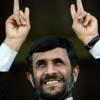EU, Iran seek common ground on nukes
(AP)Updated: 2007-03-27 08:37
VIENNA, Austria - A top European envoy on Monday renewed an offer from six world powers to talk with Tehran over its nuclear ambitions, and a senior Iranian negotiator agreed to stay in contact in an effort to find common ground.
European Union foreign policy chief Javier Solana's telephone conversation with Ali Larijani, Tehran's top nuclear negotiator, was the first exchange between the representatives of Iran and the international community since the UN Security Council toughened its anti-Iran sanctions because of the Islamic republic's refusal to freeze uranium enrichment.
Solana spokeswoman Cristina Gallach emphasized it was not a negotiating session but more a message to the Iranian side that the international community was interested in "renewing ... talks and solving in a negotiated matter" differences separating the sides.
Although enriched uranium can serve as the fissile core of nuclear weapons, Iran insists it wants the technology only to generate power. Still, years of growing international mistrust over Tehran's goals led to the first set of UN sanctions in December and to agreement Saturday to impose additional Security Council penalties.
Iran remained defiant. On Sunday, it announced it was partially suspending cooperation with the International Atomic Energy Agency - the UN nuclear watchdog - by revoking a pledge to inform it of any plans to build new nuclear facilities. That could theoretically make it easier for Tehran to construct a secret uranium enrichment plant that would be safe from any Israeli or US attack.
Gallach said no new ground was covered in Monday's conversation between Solana and Larijani. She suggested Solana had repeated the main demand of the five Security Council members plus Germany - the six world powers trying to revive talks with Iran - that Tehran must freeze enrichment before any talks begin.
Beyond that, Gallach said Solana had spoken of "the willingness to create the conditions for the negotiations to resume."
"Larijani was very unhappy with the (UN) resolution," she told The Associated Press. "At the same time, he accepted the invitation for further contacts ... he indicated that he was willing to speak again in the next few days, without naming a date."
The two men have been the principal negotiators on the issue of Iran's nuclear program. The EU is eager to continue talks with the Iranians as part of a "twin-track" approach - gradually imposing tougher sanctions if Tehran refuses to halt enrichment while offering economic and political advantages on behalf of the six powers if it falls into line.
The newest Security Council measure bans Iranian arms exports and freezes the assets of 28 people and organizations involved in Iran's nuclear and missile programs. About a third of those are linked to the Revolutionary Guard.
Before the conversation between Solana and Larijani, a senior State Department official urged the Iranians to choose negotiations over confrontation.
"We would all ask Javier Solana to now undertake some vigorous diplomacy with Larijani to see if we can convince the Iranians that the way forward is not through punitive measures, through the Security Council, and through sanctions, but through negotiations," said Nicholas Burns, undersecretary for political affairs.
Iran said it remained interested in negotiations, without, however, addressing the demand for an enrichment freeze.
"Iran is not after adventurism," said Kazem Jalali, the spokesman of parliament's committee on foreign policy and national security, insisting his country does not want "to make the situation more complicated."
|
||
|
||
|
|

